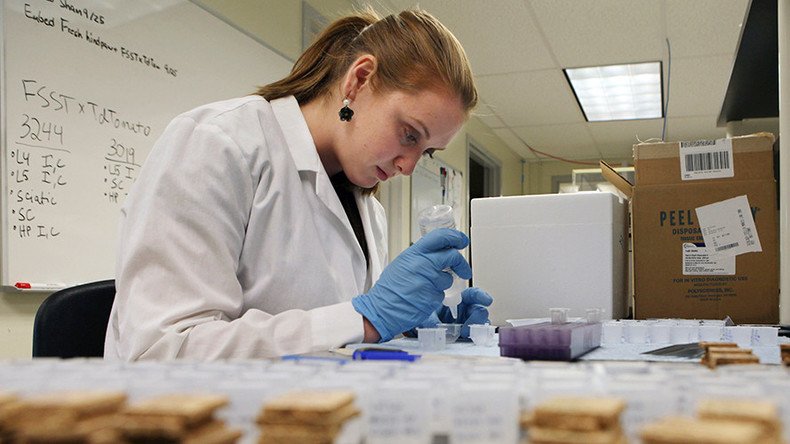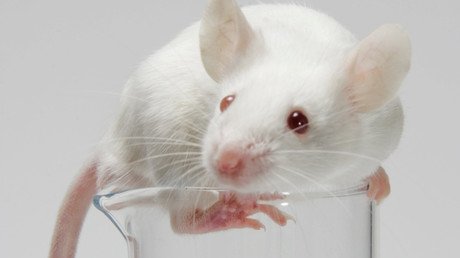‘Serial killers’: FDA panel recommends approving 1st gene-altering leukemia treatment

A Food and Drug Administration panel has approved the first-ever gene therapy to treat Leukemia. The immunotherapy works by genetically alters a patient’s own cells to fight cancer and bolsters the immune system to shut down the disease.
A panel of cancer experts unanimously endorsed the leukemia treatment on Wednesday in a 10-0 vote, according to AP. The FDA is not required to follow the panel’s recommendation, but often does.
“This is a major advance,” said panel member Dr. Malcolm A. Smith of the National Cancer Institute. He added that the treatment is “ushering in a new era.”
Called CAR T-cell therapy, and devised by the University of Pennsylvania and Novartis Corp, it works by creating a separate treatment for each patient.
Millions T-cells (a type of immune cell) are from removed the patient’s blood. The technique employs a disabled form of HIV, the virus that causes AIDS, to carry new genetic material into the T-cells to reprogram them. The process turbocharges the T-cells to attack B-cells, a normal part of the immune system that turn malignant in leukemia. The T-cells hone in on a protein called CD-19 that is found on the surface of most B-cells.
Watch how this gene therapy to fight a blood cancer in children works. It was just endorsed by an FDA panel. Story: https://t.co/xn10ooGdGUpic.twitter.com/POBlh13zzn
— AP Health & Science (@APHealthScience) July 12, 2017
Dr. Carl H. June, a leader of the University of Pennsylvania team that developed the treatment, called the turbocharged cells “serial killers.”
A single one can destroy up to 100,000 cancer cells, the New York Times reported.
The treatment destroys not only leukemic B-cells but also healthy ones, which help fight germs, patients then need treatment to protect them from infection. Every few months they receive infusions of immune globulins.
The one-time leukemia treatment, which will cost in the hundreds of thousands of dollars, would be for children and young adults with the most common form of childhood cancer, B-cell acute lymphoblastic leukemia, and who are facing death because other treatments have failed.
More than 600 patients in the US each year reach that critical stage.
A panel of cancer experts endorsed a leukemia treatment that could be the first gene therapy available in the U.S. https://t.co/g8u8GtnnI3
— Fox News (@FoxNews) July 13, 2017
In drug trials, the immunotherapy results worked far better than chemotherapy and newer types of cancer drugs. Of 52 patients who results were analyzed, 83 percent had complete remission. Most patients suffered serious side effects but nearly all recovered.
“It’s a new world, an exciting therapy,” said Dr. Gwen Nichols, the chief medical officer of the Leukemia and Lymphoma Society, which paid for some of the research that led to the treatment, the New York Times reported.
The next step, Nichols said, will be to determine “what we can combine it with and is there a way to use it in the future to treat patients with less disease, so that the immune system is in better shape and really able to fight.”
“This is the beginning of something big,” she added.
Novel gene therapy for leukemia clears FDA panel https://t.co/F4ODekgLdapic.twitter.com/8kKSCbXUZa
— Scientific American (@sciam) July 13, 2017
The short-term side effects, including fever and hallucinations, are often intense as the body’s revved-up immune system goes on the attack. The long-term side effects of the treatment are unknown. The panel recommended patients who receive the treatment be monitored for 15 years.
One of those patients, Emily Whitehead, now 12, was at the panel’s meeting with her parents, who advocated for approval of the drug. She was the first child to be given the altered cells at the age of 6 in a study at the Children’s Hospital of Philadelphia in Pennsylvania. The severe side effects of raging fever, crashing blood pressure and lung congestion nearly killed her, but she has remained cancer-free since then.
Whitehead’s treatment process took about 16 weeks, which the FDA advisors said can be too long for some desperately ill patients. However, the drug company said they can now produce the treatment and get it to a patient in about three weeks.
Novartis is seeking approval to use the treatment on patients aged 3 to 25 with blood cancer.
Other biotech and pharmaceutical companies are developing gene therapies, with some treatments approved internationally, AP reported.
A treatment for head and neck cancer in China was approved in 2004. Last year, two were approved in Europe. GlaxoSmithKline’s Strimvelis is being targeted to treat severe combined immunodeficiency with a $670,000 price tag.
UniQure’s Glybera was approved to treat a rare enzyme disorder, but it was only used once in five years and, with a $1 million-plus price tag, the company is pulling it from the market.













